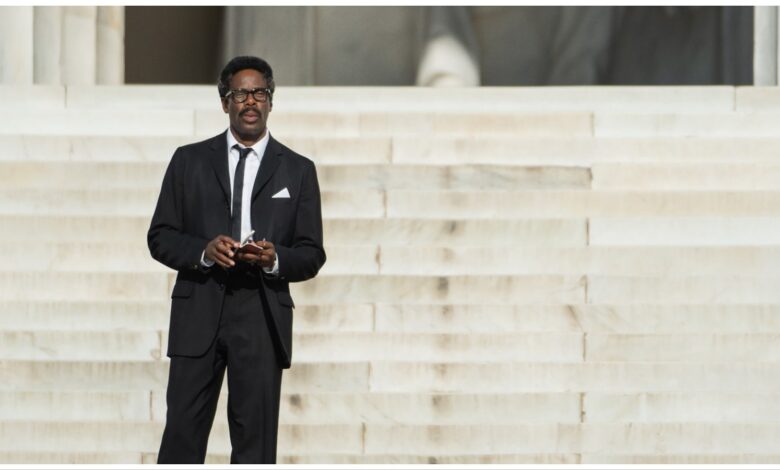Rustin movie review: Barack Obama-produced Netflix film doesn’t do justice to Colman Domingo’s fiery central performance | Movie-review News

At one point in the new Netflix film Rustin, the titular character — civil rights activist Bayard Rustin — is described as ‘a shark trapped in a shot glass’. The architect of the 1963 March on Washington, best known outside the United States as the venue for Martin Luther King Jr’s “I have a dream” speech, Rustin channeled all his personal angst as a gay Black man and a fiercely passionate social reformer into the movement. Unfortunately, director George C Wolfe’s by-the-numbers biopic is the very shot glass in which its star, Colman Domingo, finds himself trapped.
Long overdue for a role like this, Domingo is by far the best thing about the movie, which, as you unfortunately grow to learn over its hour-and-a-half run-time, isn’t exactly a flattering comparison. His performance highlights the charismatic eccentricity of Rustin, whose long battle for equality unfolded mostly behind-the-scenes. Despite his immense contributions, he remains an underrepresented figure in history textbooks, some of which he is apparently being written out of. And it’s thanks in part to executive producers Barack and Michelle Obama that Rustin was able to get off the ground.
The snappily paced narrative jumps from scene to scene with the urgency of Rustin himself. The movie also occasionally cuts to monochromatic flashbacks in which Rustin’s personality is established, and the origins of his determination explained. “Do not kill an impulse before it is born,” he implores in one of the film’s best scenes, sitting alongside a group of young men and women in a cramped room, creating the ‘toolkit’ for the March to Washington. Rustin micro-manages every aspect; from figuring out the logistics of transporting hundreds of thousands of people to the Capitol from across the country, to deciding the menu (peanut butter and jelly sandwiches, of course).
But before this, he is forced to leverage his ruptured goodwill into convincing Black decision-makers to support his vision. These scenes are marked by infighting, with the heads of the various Black groups — religious and political — clashing over inconsequential topics such as songs and banners. Like an outspoken tech CEO having alienated himself from his own board, Rustin is kicked out. But with nobody left to turn to and little progress to show for the lost time, he’s brought back, now with the endorsement of his old friend, MLK Jr.
Retaining the sort of filmed play aesthetic of Wolfe’s previous film for Netflix, the electric Ma Rainey’s Black Bottom, Rustin plays out almost entirely indoors and is populated by actors who deliver their lines with the sort of energy usually reserved for acceptance speeches at the Oscars. Scene after scene is devoted to back-room wheeling and dealing, but the writing is juvenile, and the exposition clunky. Sample this gem: “You are a man of exceptional skills and of keen intellect, but until you admit your anger at being abandoned by your parents, which is why you became homosexual, to hurt them and yourself, you will never be fully whole.”

With a fact-based film such as this, there’s little wiggle-room for creative license. For instance, Wolfe was never going to end his movie inside a hotel room while 100,000 protestors congregated at the steps of the Washington Monument. He had no choice but to show the magnitude of the moment, regardless of any restrictions. Perhaps inspired by the perseverance of his protagonist, he ploughs on, knowing full well that he doesn’t have the necessary resources to stage the climax properly.
And so, we end up with a rather underwhelming final 20 minutes, in which several scenes play out against a poorly lit green screen backdrop, intercut with jarringly grainy archive footage of gathering crowds and choppily edited shots that do a disservice to the immensity of the occasion. For instance, we only hear the very end of MLK Jr’s speech, and before you know it, the crowds have disappeared, cleaning drives are on full swing, and text on the screen is letting you know what happened next. It’s almost as if Wolfe is actively nudging your attention elsewhere, because he is too embarrassed by the slapdash manner in which he was forced to end the film.
Even Domingo, who was the only glue keeping it all from falling apart, is relegated to the sidelines in this scenes, both literally and figuratively. And with no emotional anchor to ground the increasingly shoddy filmmaking, you’re left with no choice but to shake your head in regret. If he doesn’t score a nomination at the Academy Awards, it will only be because the movie doesn’t do justice to his performance.
Rustin
Director – George C Wolff
Cast – Colman Domingo, Aml Ameen, Glynn Turman, Chris Rock, CCH Pounder, Jeffrey Wright, Gus Halper
Rating – 2.5/5







